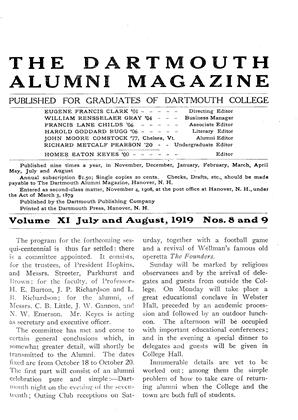The departments of Greek and Latin will introduce this year a course of unique interest entitled "The Classical Foundations of Modern Civilization." The course requires no knowledge of Greek or Latin, and, in fact, is intended primarily for those who, otherwise, would go through college with no conception of the importance of ancient civilization. Various aspects of ancient life will be considered with particular reference to their influence upon present conditions and the thought of modern times. For example, the study of Roman history and the development of the Roman provincial system naturally leads to a consideration of the origin and characteristics of the Latin peoples of the present time. The study of the science of government, which has been so stimulated by the war, should begin with Greece and Rome, and yet many of those who specialize in this subject are ignorant of the ancient theories and achievements upon which modern government is based. It is the purpose of the new course not only to describe conditions in the ancient world, but to trace the history of governmental conceptions down to modern times.
Other aspects of ancient civilization, — religion, education, philosophy, literature, and art, — will be similarly treated. It is interesting to note, for example, that the elective system was introduced in the Roman schools in the first century after Christ and to compare the results with those now being secured in our own educational institutions. Greek literature, art, and architecture will be studied as the origin and inspiration of the best in modern times. The student of English literature can have no complete understanding or appreciation of much that he reads without some knowledge of both Greek and Latin literature. The works of many of the best English writers are inspired by classical literature and are full of classical imitations and allusions. A considerable part of the work in the new course will consist in the reading of ancient literary masterpieces in translation, in the discussion of their characteristics and of their influence upon modern literature.
The introduction of a course of this kind is a partial answer to critics who complain that college education gives only knowledge of a fragmentary nature — disconnected subjects or parts of subjects — and, as such, it may be grouped with the projected courses in citizenship and evolution.
 View Full Issue
View Full Issue
More From This Issue
-
 Article
ArticleCOMMENCEMENT, 1919
July 1919 -
 Class Notes
Class NotesCLASS OF 1899
July 1919 By KENNETH BEAL -
 Article
ArticleREPORT OF THE TRUSTEES MEETING
July 1919 -
 Article
ArticleTHE COLLEGE: RETROSPECT AND OUTLOOK
July 1919 By Ernest Martin Hopkins -
 Article
ArticleA TWENTY-FIVE YEAR REUNION
July 1919 -
 Article
ArticleThe program for the forthcoming
July 1919







